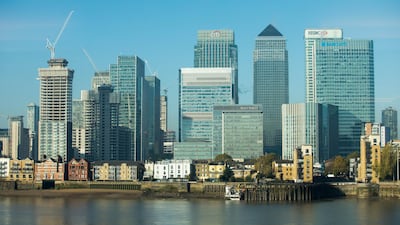A group of major banks including Citigroup, Royal Bank of Scotland and Barclays have been fined more than €1 billion (Dh4.4bn) for allegedly colluding in the trade of large sums in foreign-exchange markets, the European Commission announced Thursday.
The three plus JP Morgan and Mitsubishi UFJ Financial Group agreed to pay European Union fines totalling €1.07bn.
Citigroup was hit hardest with a €310.8 million penalty, followed by fines of €249.2m and €228.8m for RBS and JP Morgan, the European Commission said on Thursday.
Barclays was fined €210.3m and Mitsubishi UFJ Financial Group must pay nearly €70m as part of the settlement with the EU's anti-trust regulator, Bloomberg reported.
Traders ran two cartels on online chatrooms, swapping sensitive information and trading plans that allowed them make informed decisions to buy or sell currencies, the regulator said. Many of them knew each other, calling one chatroom on the Bloomberg terminal the "Essex Express n' the Jimmy" because all of the traders but one met on a commuter train from Essex to London. Other rooms were called the "Three Way Banana Split" and "Semi Grumpy Old Men".
"Foreign exchange spot trading activities are one of the largest markets in the world, worth billions of euros every day," EU Competition commissioner Margrethe Vestager said.
"These cartel decisions send a clear message that the commission will not tolerate collusive behaviour in any sector of the
financial markets."
While large, the cartel fines are lower than a €1.3bn penalty for banks for rigging Euribor rates and below a record €3.8bn penalty for collusion between truck makers.
UBS escaped a fine because it was the first to tell regulators about the collusion. The five other banks won reduced penalties by striking a settlement with the commission that won't allow them to challenge the EU's findings. Credit
Suisse was separately charged by the EU over FX collusion last year and a fine may come at a later date.
Traders' manipulation of benchmark foreign-exchange rates was exposed in 2013 Bloomberg articles, triggering regulatory probes in the US, the UK and Switzerland. More than a dozen financial institutions have paid about $11.8bn in fines and penalties globally, with another $2.3bn spent to compensate customers and investors. Former US attorney general Loretta Lynch in 2015 said the banks engaged in a "brazen display of collusion" to game markets.
"We are pleased to resolve this historical matter, which relates to the conduct of one former employee. We have since made significant control improvements," a spokesman for JPMorgan said.
MUFG said it is "committed to ensuring integrity and compliance with the regulatory authorities in every jurisdiction in which we operate, and have taken a number of measures to prevent this occurring again."
Citigroup declined to comment. Tom Hoskin, a spokesman for Barclays in London, didn't immediately respond to requests forcomment. RBS had no immediate comment.
Traders exchanged information about outstanding customers' orders, bid-ask spreads, their open-risk positions and details of current or planned trading activities. They would sometimes agree to "stand down" or stop a trading activity to avoid interfering with another trader in the group. They traded 11 currencies, including the euro, the US dollar, the British pound and the Japanese yen.
While the US has won guilty pleas from JP Morgan, Citigroup, RBS and Barclays, three British traders in a group known as "The Cartel" were acquitted by a US federal courtlast year of using a chatroom to coordinate trades andmanipulate prices on the spot exchange rate for euros and US dollars.

